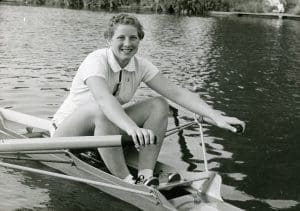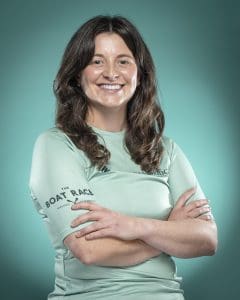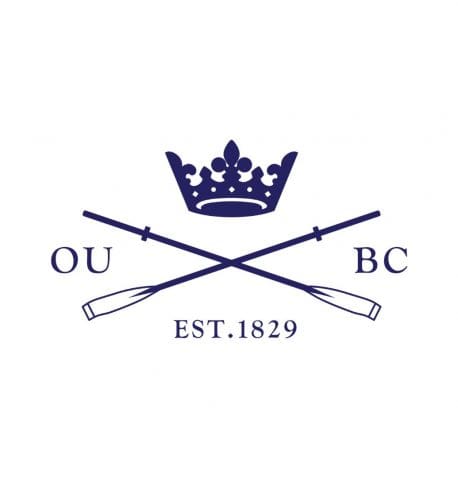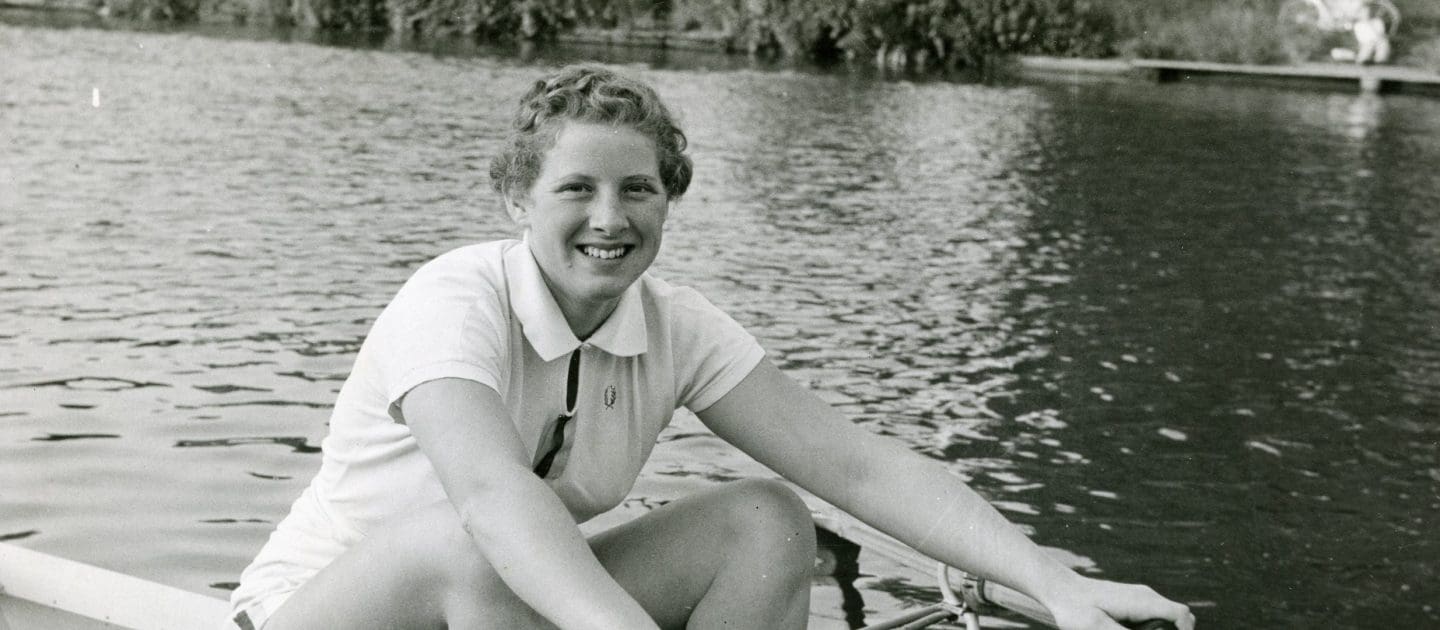Olivia Bothamley-Dakin
Photo: Penny Chuter’s personal collection.
Last November, the rowing world mourned the death of Penny Chuter, an inspirational athlete and coach who carved the way for women to sit at the top table in rowing. We’re proud of the role The Boat Race played in Penny’s career when she made history in 1994 being appointed head of Oxford University Boat Club.
Born into a world where many rowing clubs were for men only, Chuter through talent and grit broke down barriers.
men only, Chuter through talent and grit broke down barriers.
To the teenager carrying her own oars into Berlin’s Soviet zone through Checkpoint Charlie to go and train with the East German women’s squad, to becoming the first paid female rowing coach in the UK, Chuter throughout her career re-wrote the rowing rule book.
After retiring from international competition, where her career highlight was winning a silver medal at the 1962 European Championships, Penny spent a few years as a PE teacher before being appointed as National Coach for Women’s Rowing and Coach Education in 1973.
Starting completely from scratch, Chuter created and led a new GB women’s national squad, which went on to compete in the first women’s events at the World Rowing Championships in 1974 and then at the Olympic Games in 1976.
Lin Clark, who won the first international gold medal for a British women’s crew in the lightweight doubles in the 1985 World Championships, was taught to row by Chuter and was a member of her first women’s squad.
Clark said:
“She’d been given the quest to take women to the Olympics but it was a two-edged sword because they gave her nothing really to start with.
“However, whatever Penny engaged in, she had to do it to the best of her ability and she left no stone unturned.
“She was exhaustive in her methods from seat racing to video analysis. Penny really was ahead of her time.”
In 1978, she coached Jim Clark (Lin’s husband) and John Roberts to a silver medal at the World Championships in New Zealand and, by doing so, broke the taboo of women coaching men: a taboo that still remains in most professional sports.
It was Lin who first encouraged Penny and Jim to work together, a partnership that was unpopular with the press and the rowing community at the time.
“I remember one male selector saying that they will never do anything. When they got their medal, the papers were shocked.”
After that, Chuter rose through the ranks of the ARA where in 1982 she was appointed Director of Coaching for all teams before becoming Director of International Rowing in 1986.
In her role on the Women’s Commission and Competition Commission at World Rowing, Chuter was influential at increasing the distance rowed by women from 1000m to 2000m, making racing conditions fairer, introducing a series of World Cup regattas and running development camps.
Clark said: “I think her greatest legacy is actually dragging rowing into the 21st century.
“If it wasn’t for Penny, women could still be rowing 1000m. Lightweight rowing might not have happened. Penny was very respected internationally and I think she was perhaps more widely thought of worldwide than in her own country.”
Chuter made history once again in 1994 after being appointed the Chief Coach of Oxford University men, where she stayed for two seasons.
This was not Chuter’s first foray into Boat Race campaigns. In 1991, she stepped in to help for two weeks when the chief Cambridge University coach Mark Lees was ill.
Chuter joined Oxford in 1994 on a losing streak and subsequently faced the critics, yet her passion for the Boat Race cannot be denied. In her own words, losing the Boat Race was “a kind of dying”.
Country Life magazine in 1995 described Chuter as “motherly” with a “bubble-cut hairstyle”. Nothing was written on her ability as a coach.
However, those coached by Chuter remember her astute fairness, talent and her loquacious style. As a former PE teacher, Chuter also adopted an approach to training underpinned by science-based physiological principles.
Jon Kawaja, bowman in the 1995 Oxford Boat said:
“I give Penny enormous credit for stepping into a role and a team historically dominated by men, where strong personalities, the passion for competition, and highly public performance often stir controversy.
“She believed in her methods and had conviction – leading others to believe in her in a miraculously short period of time. I look back on those days as formative to my lifelong understanding of the sport – from technical to physiological to psychological aspects – and credit Penny with teaching approaches that, 30 years later, stand the test of time.”
A study by UK Sport in 2022 found that only 10 percent of coaching positions within high-performance sport in the UK are held by women, and rowing is not immune to this coaching gap between the sexes.
Although our sport sits at around a 50% men/women split for rowers at all levels, the percentage of women coaching is significantly lower. Nearly 70% of British Rowing members who have a coaching qualification in their membership profile are male.
To date, Chuter is the only woman to oversee a programme for the OUBC or CUBC openweight men’s teams.
Whilst Chuter’s legacy as a coach is unparalleled, work needs to be done to make sure she didn’t leave it in vain. Both Oxford and Cambridge have taken steps forward in recent years to address the coaching gap.
Zoe Taylor, Assistant Coach at Oxford, works across the open, lightweight and development crews for both the men’s and women’s programmes.
Taylor said: “Penny proved that coaching at the highest level should be about ability. Her impact on British Rowing was immense, and her legacy serves as both inspiration and a reminder to all of us to continue breaking down barriers.
“Oxford is proud of its rich history of female coaches, striving to ensure future generations of rowers see and value female leadership.
“Female coaches remain underrepresented in elite sport, but Penny showed decades ago that excellence in coaching knows no gender.”
Matilda Horn, Assistant Coach of Cambridge Women also credits Chuter as a personal inspiration.
“Penny Chuter’s influence on women’s rowing is undeniable. She carved a path where, frankly, there wasn’t one before. Her success not only proved that women could coach at the highest level, but it also inspired a generation of female coaches, me included, to strive for more.”
 Yet Horn recognizes that more work needs to be done.
Yet Horn recognizes that more work needs to be done.
“It strikes me that still not enough has changed for women in coaching based on the challenges Penny faced in her era of coaching, and the challenges women feel they face now. It is progressing and it brings me much joy to see female coaches in so many programmes across the country. Yet there are so few in leading roles.
“I have heard women in rowing coaching being criticised of not being of the standard to be coaching at an elite level, Penny showed us that this is not the case. An apparently different style does not mean it is wrong but potentially suggests that as the world progresses, sport still lags.
“Thanks to pioneers like Penny, the landscape for female coaches was initiated and continues to progress but we still have work to do.
“Having female coaches in rowing is crucial, it creates a more inclusive environment for athletes. It’s not just about representation, it’s about perspective. Female coaches bring valuable skills and perspectives that transform the athlete experience. These skills, coupled with the power of representation, cultivate trust and open communication, leading to improved performance.”
Undoubtedly, Chuter was a trailblazer. The challenge for those in our sport now is, how do we continue to blaze that trail?



